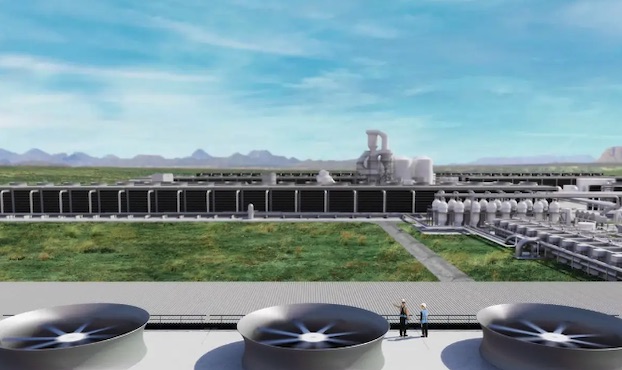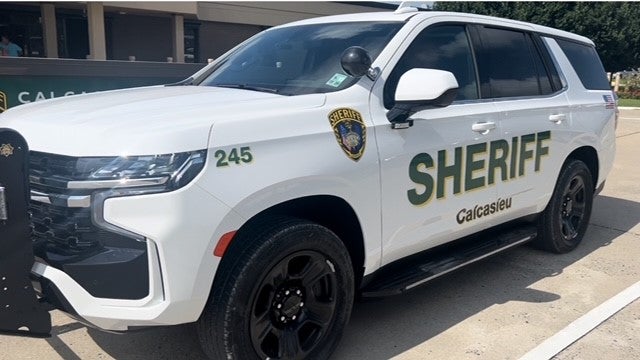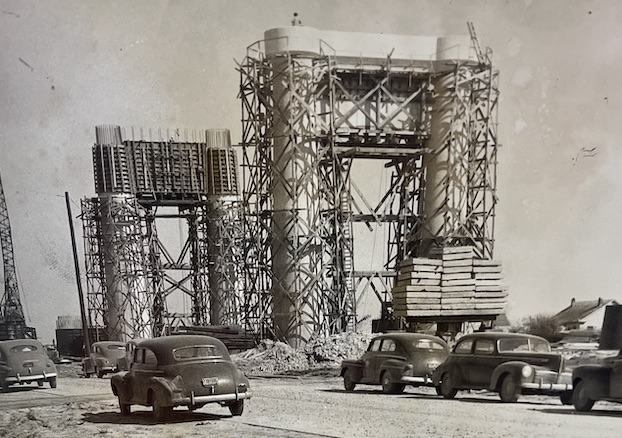Hundreds attend meeting as proposed carbon capture project faces backlash
Published 9:57 am Thursday, January 16, 2025

- Occidental subsidiary 1PointFive has already received federal funding to go toward building the South Texas Direct Air Capture Hub. (Photo courtesy of 1pointfive.com)
A proposed carbon capture project faced a backlash Monday as hundreds of residents from Allen, Jeff Davis, Vernon and surrounding parishes packed a public hearing for a seismic permit.
Paragon Geophysical Services, Inc. has been contracted by Oxy (Occidental) 1Point Five to conduct a seismic survey for a possible carbon (CO2) sequestration project in Allen Parish.
The project is planned for a portion of Allen Parish extending east of Grant and Sugartown, west of Oakdale, south of Elizabeth and north of Mittie. A large section of the eastern portion of the project will be in the West Bay Wildlife Management area which is privately owned by four timber companies.
Doug Conquest, vice president of Oxy Low Carbon Ventures, said the project is still in the preliminary planning stages, including conducting seismic surveys, selecting locations and determining the size of the pipeline.
“This is a business and this business only works if you capture the carbon dioxide from industrial facilities, press it in a pipeline and transport it for storage,” Conquest said, noting large quantities of CO2 are needed to make the project work.
It will take three years before the project can begin pumping the CO2 underground after the project completes the permitting process, Conquest said.
Allen Parish currently has three Class V stratigraphic test well permit applicants related to the CO2 sequestration projects, according to Parish Administrator Jacob Dillehay. No permits have been issued for Class VI injection wells, he said.
Joe Maryman, a Louisiana Department of Wildlife and Fisheries biologist who monitors seismic testing, and Tanya Matherne Matcek, president of Desco Environmental Consultants, said the company is required to hold a public meeting before a seismic permit can be issued and any seismic activity can begin.
“We will review everything after the meeting tonight, then we will issue the (seismic) permit if we feel everything is good to go,” Maryman said.
The Allen Parish Police Jury is also reviewing the permit applications for the road access and any possible damage to parish roadways caused by seismic activity, according to Dillehay.
A permit must be issued for each landowner before any seismic survey can begin on the property. The surveys are needed to lay out individual receiver lines to obtain subsurface seismic data.
No dynamite or other explosive materials will be used, according to Maryman.
The seismic company must obtain a permit for each individual landowner before they can survey a property using a vibrator truck.
“They won’t access any property for which they haven’t obtained access permission from the landowner,” Matcek said. “There is potential that even though your property is located in this project area, they won’t need to access your property so you won’t be contacted for a permit.”
Impact to the property will be very minimal from start to finish with seismic crews having to access the property twice, Matchek said.
“By allowing the seismic you are not committing to anything other than allowing the seismic,” Bruce Fulker, president of Cougar Land Services, said.
A separate agreement will be needed to allow the CO2 project access to property.
Property owners will not have access to the seismic reports which concerns Joe Manuel of Oberlin.
“People want to know what you are seeing on their property before you lease it to them,” Manuel said. “……A man work’s his whole life and he bought that land. That’s his land and he has the right to know what’s on his land.”
Manuel also called for transparency from the company, as well as the Allen Parish Police Jury and other officials who he says are not asking the right questions.
“If you are going to be transparent in this Point A to Point B make it easier on the people that don’t have a clue of what you are fixing to do or how your pipeline runs or what your down pipe is made out,” he said. “There’s a lot of questions that the community wants to know that are not there. I think the police jury should be asking more questions.”
Many safety factors have yet to be addressed, Manuel said.
Police Juror Roland Hollins of Mittie said the local government’s authority over CO2 projects have been taken away since 2020 but a push is underway to change how the projects are handled and involve local government bodies.
“I believe we have to do everything we can,” Hollins said. “When I got on this police jury at the beginning of last year, I went to talking to the police jury about what we have to do about the risks.”
The police jury sent a resolution to the governor, legislators and National Resource Department urging them not to grant any Class 6 permits until local governments had more understanding of what was going on and residents had a voice on the matter.
The Louisiana CO2 Alliance was also created to give the people a voice and push for better regulations, notification systems and more safety measures, he said.
“We have worked hard to make sure we get some bills passed on safety, mitigation, liability and we are asking for a bill that there be a criminal charge if there is a leak in these wells and it isn’t shutdown immediately and that the local government and state are notified,” Hollins said. “These are things we have been talking with the companies and legislators about to address the issues, but the police jury’s authority has been taken away.”
Unwanted risks
Parishes and communities are being forced to take risks they do not want, Hollins said.
The police jury has spent $60,000 on a risk assessment study which will be presented to the public in March.
“We are fixing to potentially pump half a billion tons, or even more than that, CO2 under our aquifer and that’s a risk,” Hollins said. “It’s our water. It’s our communities and we need to protect all of it that we can.”
Rusty Reeves of Reeves said most of the area’s water wells are below the Chicot Aquifer and in the Evangeline Aquifer.
“I think you will do everything to protect us, but if you contaminate our drinking water supply, there’s not enough money to clean that water up,” Reeves said. “If we get one leak and it gets to our drinking supply, y’all are all off somewhere else, but it’s the people in this room that’s drinking this water.”
Jeff Davis Parish Police Jury Byron Buller of Kinder said, “It’s not if, it’s when.”
“I think people here don’t want it here,” Allen Parish Police Juror Joe Perkins of Reeves said. “Our water is our water and that’s all we’ve got. They need to push that stuff to the Gulf of Mexico because we don’t want it here.”
Temisha Victorian, an RN from Oberlin, also voiced concern for public safety. A carbon dioxide leak in 1986 in Cameroon in west Africa killed around 1,700 people and 3,500 animals, she said.
A carbon dioxide pipeline rupture in Satarita, MS in 2020 hospitalized nearly 50 people and forced the evacuation of about 200 residents. A carbon sequestration leak was also reported at a plant in Illinois.
“I don’t think anybody is focused on the health effects of what we and our children are exposed to,” she said. “None of that is being put into those risk assessments. I think we need to have an expert here that has the background and the education to inform all of us so we can make informed decisions because it is affecting all of us.”
“I guarantee you if the legislators had this well that y’all are trying to put in Allen Parish in their backyard, it wouldn’t be done,” her mother, Equilla Victorian of Oberlin said.
Conquest said the risk for a leak is very small but monitoring and other measures will be in place to minimize those risks.





